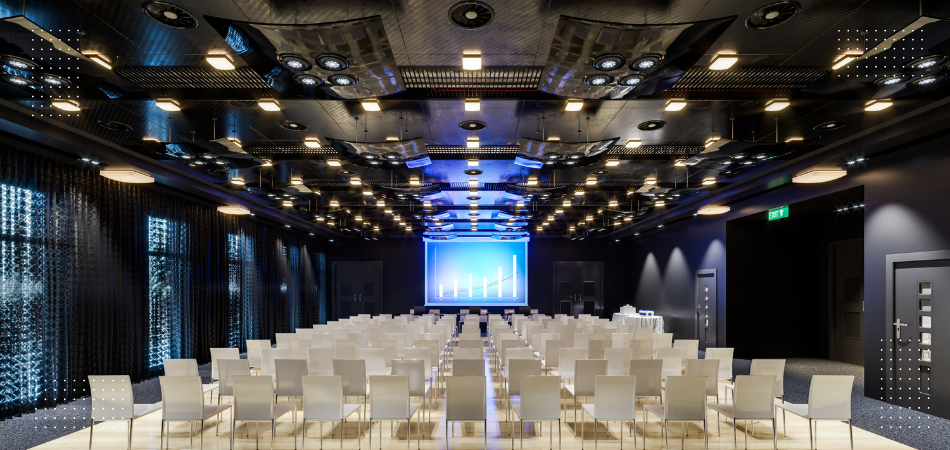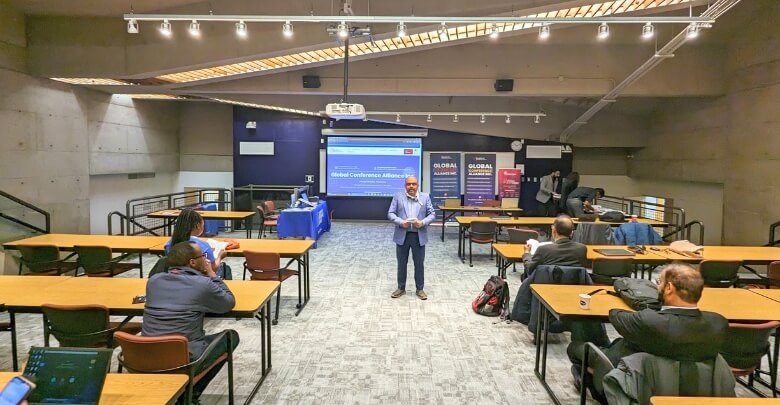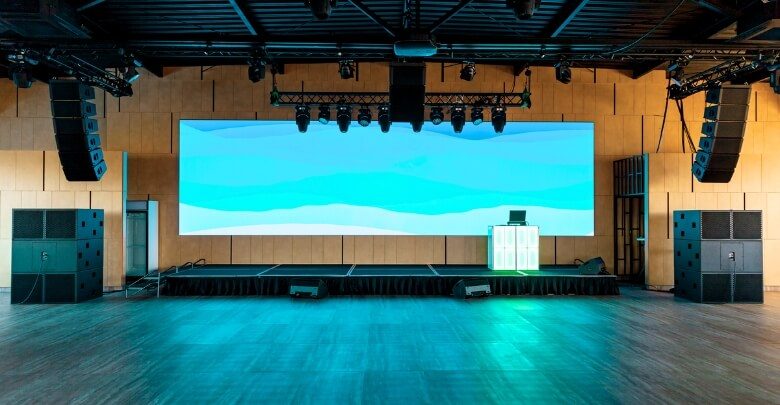Renting a conference room is common for businesses and organizations needing space to hold meetings, presentations, and events. However, the cost of renting a conference room varies depending on several factors that can significantly affect the overall price. So, how much does it cost to rent a conference room?
For example, the location, size, capacity, amenities, and services included in the rental can all impact the final cost of renting a conference room. Prices typically range from $50 to $500 per hour.
Dig into the content to explore in-depth information about the cost of renting a conference room. Here, you’ll find a comprehensive discussion regarding that.
Key Takeaways
- The cost of renting a conference room varies depending on location, size, capacity, amenities, services, decor and ambiance, technology, and equipment.
- When selecting a conference room, essential considerations include size and capacity, seating arrangements, technology requirements, catering services, furniture arrangements, and parking availability.
- To find the best deal on conference room rentals, negotiate with the venue provider, book during off-peak periods, explore alternative options, and research beforehand.
- Other key points to keep in mind include the fact that costs can range from a few hundred to several thousand dollars, prime locations are more expensive, amenities and services greatly impact success and satisfaction, and co-working spaces and business centers offer more affordable options, as do local colleges and universities.
Factors Affecting the Cost of Renting a Conference Room
If you plan a conference, you’ll need to consider renting a conference room and its costs. Various factors, including the decor and ambience of the space and the technology and equipment available to users, determine the cost of renting a conference room.
The decor and ambiance of a conference room can impact the rental cost because a more luxurious and visually appealing space may be associated with higher rental fees, which is the prime consideration of any legitimate conference organizer.
Additionally, the technology and equipment available in the space can also impact the rental cost. Conference rooms with advanced technology and equipment, such as video conferencing systems, may command a higher rental fee.
The location of the conference room is another essential factor that can impact the rental cost. Conference rooms located in prime locations, such as city centers or high-end hotels, may be more expensive to rent due to their proximity to business centers or tourist attractions.
On the other hand, conference rooms located in more remote areas or less desirable locations may be less expensive to rent. The size, availability, and duration of use are also important factors to consider when determining the cost of rental for a conference room.
Location of the Conference Room
Located at the city’s heart, this space is a hub where ideas and collaborations converge. The location of a conference room significantly influences the overall experience, attendance, and costs associated with renting it. Factors such as accessibility, proximity to public transportation, and nearby accommodations often determine a venue’s desirability.
Conference rooms in areas easily accessible by public transportation or private vehicles typically command higher rental rates compared to those in more remote locations. For instance, venues that host prominent events, such as an international conference in Canada, or any other country like Mexico, Australia, USA or Dubai often emphasize proximity to major airports, public transit hubs, and urban amenities to attract global attendees and ensure a successful event.
Additionally, conference organizers must carefully consider parking availability. Limited parking options can discourage potential attendees from participating, directly affecting turnout and event success.
Transportation options are also crucial. Attendees traveling from various parts of a city or internationally value convenient access to buses, trains, taxis, or ride-sharing services. Selecting a conference room location well-serviced by diverse transportation methods ensures higher attendance rates.
Moreover, the availability of nearby accommodations, including hotels, restaurants, and entertainment venues, further enhances the appeal of the conference location. Although proximity to these amenities may increase rental costs, they play an essential role in the overall success and attendee satisfaction of a conference.
Size and Capacity of the Conference Room
The size and capacity of a conference room is a crucial factor that impacts the overall experience of attendees and the effectiveness of the conference itself. When selecting a conference room, consider the number of participants attending.
The seating arrangements should be appropriate for the number of attendees, and there should be enough space to move around comfortably. Consider the technology requirements that will be needed for the conference, such as audio-visual equipment, internet access, and power outlets.
A lack of space can limit the ability to provide proper seating arrangements and technology requirements, resulting in a less effective conference. While some argue that smaller conference rooms are more cost-effective, consider the potential limitations of a lack of space. A smaller room may not be able to accommodate all the participants, which can lead to discomfort and a lack of engagement.
On the other hand, a larger conference room may be more expensive, but it can provide more space for attendees to move around and interact. Find a balance between the size and cost of the room to ensure that the conference is effective and comfortable for all participants.
Amenities and Services Included in the Rental
One key factor to consider when selecting a conference venue is the range of amenities and services included in the rental package. These amenities and services can significantly impact the event’s success and the attendees’ satisfaction.
Technology options, such as audio-visual equipment and high-speed internet access, are essential for presentations and can make a big difference in the effectiveness of the meeting.
Catering services, including coffee breaks and meals, are also essential to keep attendees energized and focused throughout the day. Additionally, furniture arrangements and parking availability are practical considerations that can significantly affect the comfort and convenience of attendees.
Besides, if the conference room has no decoration, you’ll need to decorate the room according to your conference’s perspective. Different posters can be an excellent way to decorate the conference room. In that case, you should have a good idea about how to design conference posters.
Consider all these factors when selecting a conference room rental to ensure a successful event. A comparison table of different rental options can help make an informed decision. Make sure the conference room is soundproof. If the room is not soundproof, you’ll need to soundproof the conference room manually.
The table can include columns for technology options, catering services, furniture arrangements, parking availability, and any additional amenities or services offered. You should also ensure your chosen conference room has the right AV equipment.
By carefully evaluating these options, event organizers can select the rental that best meets their needs and budget.
Tips for Finding the Best Deal on Conference Room Rentals
To maximize cost-efficiency when selecting a conference venue, event organizers can follow several tips for finding the best deal.
One effective strategy is to negotiate with the venue provider. You should research and know what other venues charge for similar services beforehand. This will give you leverage in negotiations and enable you to ask for lower rates or additional services.
Another negotiation tactic is to book the conference room during off-peak periods. Most venues have lower rental rates during weekdays or non-holiday seasons. By doing this, you can save a significant amount of money.
Aside from negotiating, event organizers can also consider alternative options for conference room rentals. For instance, co-working spaces or business centers can offer conference rooms that are more affordable than traditional venues. These spaces also often have flexible rental periods, making them ideal for shorter events.
However, you can also consider getting funds for your conference. In that case, you’ll need to advertise your conference so that you can reach a vast number of audiences.
Consider renting a space from a local college or university, which may have conference rooms available for rent at a lower cost. By exploring alternative options, event organizers can save money while still getting the space they need for their event.
Wrapping Up
Renting a conference room requires careful consideration of various factors affecting the cost. The room’s location, size, and amenities are just factors that should be considered when looking for the best deal. So, you should have a clear understanding of your needs and budget before making a decision.
Imagine walking into a spacious conference room with stunning city skyline views, equipped with modern technology and comfortable seating arrangements. The ambiance is professional and conducive to productive discussions and brainstorming sessions.
With the right research and negotiation skills, finding a conference room rental that fits your needs and budget can be a rewarding experience. So, take your time, research, and find the perfect conference room to help you achieve your goals.








